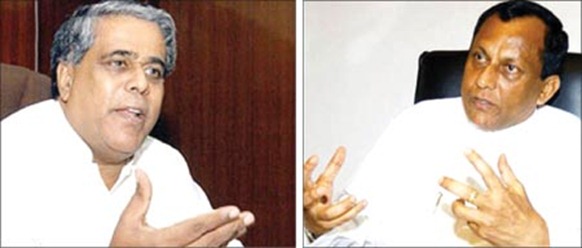 Confusion reigns over whether the government plans to implementation the Lessons Learnt and Reconciliation report following comments made by Nimal Siripala de Silva, Minister of Irrigation and Water Resource Management.
Confusion reigns over whether the government plans to implementation the Lessons Learnt and Reconciliation report following comments made by Nimal Siripala de Silva, Minister of Irrigation and Water Resource Management.
The Minister speaking at a news conference last week said the LLRC had over stepped its mandate when producing its report. He told the media that the government would now have to decide on which recommendations to implement and which not to.
He had further added that the government had a duty to look at what repercussions could arise from implementing the full report.
However showing a split in the government on the issue, Lakshman Yapa Abeywardena, acting Cabinet Spokesman, told The Sunday Leader that the LLRC was appointed by the President. “The government, the cabinet and the parliament have all accepted the report; that is the final decision,” he said. Abeywardena explained that following the report being handed over to the President, the cabinet approved it. It was then submitted to the parliament where it was accepted by all the parties. “We are now implementing some sections of the LLRC report, other sections will take a longer period to do so,” he said.
According to Abeywardena the delays in implementing certain sections of the LLRC report is because those will have to be approved by parliament. “Certain things that have been outlined in the report which can be done immediately we are doing,” Abeywardena stated. He added that some parts of the report cannot be implemented as the government will have to change its policy. “It would take time to implement those issues,” he said.
International media has taken de Silva’s comments seriously claiming that the Sri Lankan government is now taking steps to discredit the recommendations laid out in the LLRC. Abeywardena refused to comment on whether or not the government would be looking to implement the LLRC in full.
Asked if there was any timeframe in place regarding the implementation of the report, Abeywardena responded that it was dependant on the President. “The President is having a meeting with the members of the delegation who went to Geneva, following which he will discuss it with the cabinet and then make an announcement,” he said.
Dr. Paikiasothy Saravanamuttu, Executive Director of the Centre for Policy Alternatives, said the government must make it clear what it thinks are the appropriate recommendations of the LLRC. ‘the government should have made this point clear right at the start.”
Saravanamuttu further stated that he suspected the government felt the report had exceeded its mandate when it called for an investigation in to the human rights violations. On March 22, a US backed Resolution on Sri Lanka was passed at the UNHRC, the Resolution called on the government of Sri Lanka to implement the recommendations made by the LLRC which had been appointed by the President.
United States Embassy spokesperson Chris Teal, stated that, “the US has commented on the report enough both in Geneva and in Washington and so they will let the Minister’s comments stand on their own.” The original draft of the US backed Resolution was withdrawn following objections raised by India. The final draft has been criticised by some sectors as being a highly watered-down version of the original draft The ongoing confusion seems to be a result of the re-wording of the Resolution, since it does not specify whether the implementation of the LLRC recommendations must be in full or in part.
The Mandate Of The LLRC
• “To inquire and report on the following matters that may have taken place during the period between 21st February, 2002 and 19th May, 2009, namely:• The facts and circumstances which led to the failure of the ceasefire agreement operationalized on 21st February, 2002 and the sequence of events that followed thereafter up to the 19th of May, 2009.
• Whether any person, group or an institution directly or indirectly bear responsibility in this regard;
• The lessons we would learn from those events and their attendant concerns, in order to ensure that there will be no recurrence;
• The methodology whereby restitution to any person affected by those events or their dependants or their heirs, can be affected;
• The institutional administrative and legislative measures which need to be taken in order or prevent any recurrence of such concerns in the future, and to promote further national unity and the reconciliation among all communities, and to make any such other recommendations with reference to any of the matters that have been inquired into under the terms of the Warrant.”
Twitter- @dinoukc
(For updates you can share with your friends, follow TNN on Facebook and Twitter )
